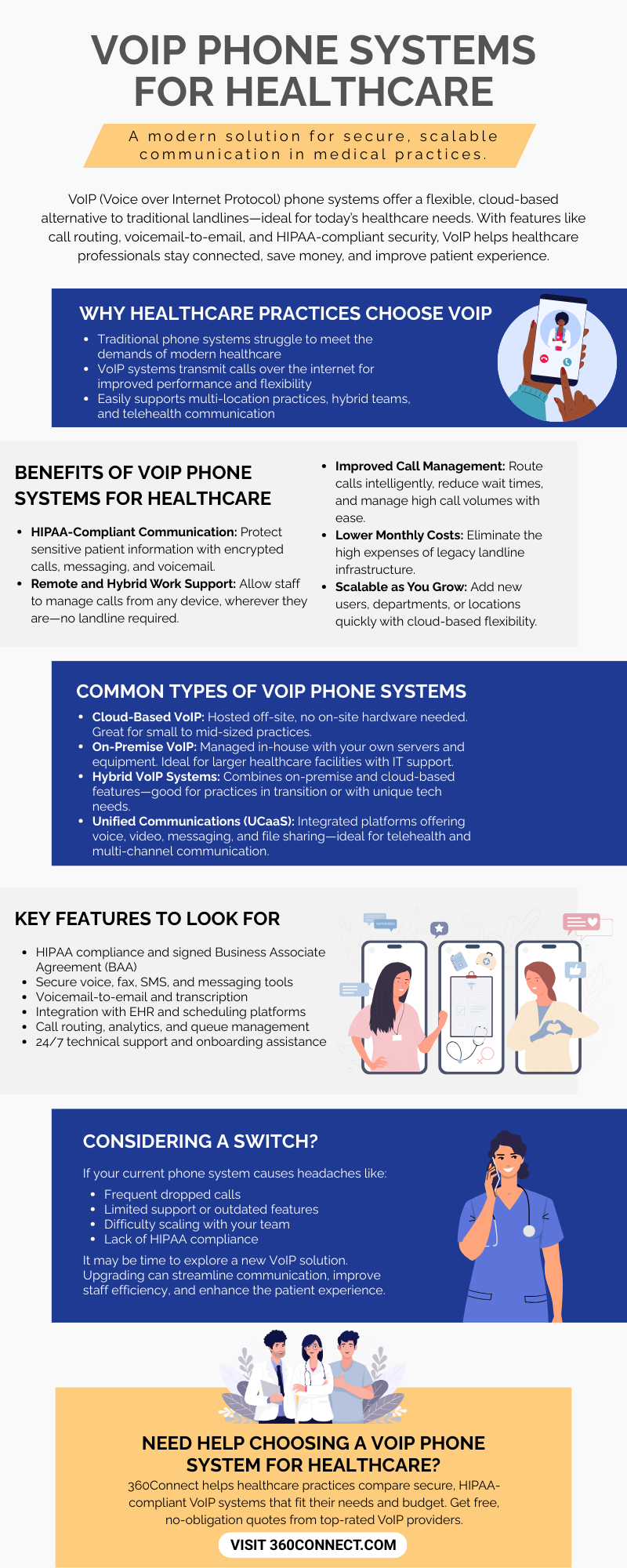In today’s fast-paced healthcare environment, communication is critical. Whether you’re scheduling appointments, handling emergencies, or consulting with patients remotely, your phone system needs to be secure, reliable, and easy to manage. That’s why more and more practices are switching to VoIP phone systems for healthcare—a modern alternative to traditional landlines that offers greater flexibility, affordability, and scalability.
These systems use the internet to transmit calls and often include advanced features like voicemail transcription, call routing, and secure messaging. And if you’re already using a VoIP system but running into issues like dropped calls or limited support, it might be time to consider switching to a better provider.
Whether you’re shopping for your first VoIP solution or looking to upgrade, this guide will help you compare the top options. But first—let’s explore why VoIP matters and what types of systems are available.
Importance of VoIP Phone Systems for Healthcare
A phone call in healthcare can be more than just a conversation—it can be the difference between delayed care and timely treatment. That’s why your phone system should support fast, secure, and seamless communication between staff, patients, pharmacies, and third-party providers.
VoIP systems offer several key benefits over traditional phone systems:
- HIPAA Compliance: Many VoIP providers offer built-in security features and are willing to sign a Business Associate Agreement (BAA), which is essential for HIPAA compliance.
- Remote Flexibility: With VoIP, your staff can make and receive calls from anywhere—perfect for remote workers, virtual care, or after-hours call management.
- Cost Savings: Since VoIP uses internet connections, it often comes at a lower monthly cost than traditional phone service. Most businesses save 30% to 50% on their phone bills with VoIP.
- Scalability: Whether you’re opening a second location or expanding services, VoIP grows with your practice.
- Advanced Features: Call routing, voicemail-to-email, auto attendants, SMS messaging, and call analytics come standard with most platforms.
As patient expectations continue to evolve and virtual care becomes more mainstream, a strong VoIP system is no longer a nice-to-have—it’s a necessity.
Related: How Much Does a VoIP Phone System Cost for a Business?

Common Types of VoIP Phone Systems for Healthcare
Not all VoIP systems are built the same. Here’s a breakdown of the most common types used in healthcare practices:
1. On-Premise VoIP
This system is hosted at your physical location and managed by your in-house IT team. It offers full control over configuration and security but requires upfront hardware investment and regular maintenance.
Best for: Large healthcare organizations or hospital systems with dedicated IT departments.
2. Cloud-Based (Hosted) VoIP
With cloud-based VoIP, your provider hosts and manages everything off-site. You don’t need to maintain any major hardware—just plug in your phones or devices, and you’re ready to go.
Best for: Small to medium-sized clinics or practices looking for a cost-effective, low-maintenance solution.
3. Hybrid VoIP
Hybrid systems combine on-premise and cloud-based VoIP capabilities. They offer a transitional solution for practices not yet ready to move fully to the cloud.
Best for: Practices that require more control but still want the flexibility of cloud access.
4. Unified Communications (UCaaS)
These systems integrate voice, video, messaging, and sometimes file-sharing and team collaboration tools into one platform. UCaaS is especially helpful in environments where patient communication extends beyond a simple phone call.
Best for: Telehealth-first providers or multi-specialty medical teams needing more than just voice communication.
Top 7 VoIP Phone Systems for Healthcare
Now that you understand your options, let’s dive into some of the best VoIP providers that cater to healthcare professionals. These systems offer HIPAA-compliant features and are trusted by medical practices of all sizes.
1. RingRx
RingRx is a top provider built specifically for healthcare practices. Designed with HIPAA compliance at its core, it offers secure voice, fax, and texting capabilities that simplify patient communication. Features like voicemail transcription, automated call routing, and EHR integration make it easy for providers to stay connected and organized.
Smaller practices love RingRx for its simplicity and affordability. The platform is scalable, making it just as useful for larger offices with growing teams. It’s also one of the few VoIP systems that offers dedicated healthcare functionality out of the box—no add-ons required.
- Best for: Small to mid-sized healthcare practices and solo providers
- Why it stands out: Built exclusively for healthcare with easy EMR integration
- Price: Starts around $15/user/month (Pricing as of 4/1/2025)
2. RingCentral
RingCentral is one of the most recognizable names in VoIP and a strong choice for healthcare providers needing a powerful, all-in-one communication platform. With voice, video, messaging, and secure fax all included, RingCentral gives teams the tools to collaborate efficiently—whether in-office or remote.
The system is HIPAA-ready and offers a Business Associate Agreement (BAA) upon request. With features like AI-powered transcription, advanced call analytics, and integrations with EHR systems and CRMs, RingCentral is highly customizable and great for growing practices.
- Best for: Multi-location practices or enterprise-level networks
- Why it stands out: Enterprise-grade features and integrations with a HIPAA-compliant option
- Price: Starts at $20/user/month (Pricing as of 4/1/2025)
3. 8×8
8×8 delivers a unified communications platform that’s ideal for telehealth providers. It combines VoIP calling, secure video conferencing, team messaging, and contact center tools in a single HIPAA-compliant solution. Providers can streamline care coordination and improve virtual visit workflows without sacrificing security.
8×8 also supports global teams and offers detailed reporting tools to help manage call volumes and staffing. For healthcare teams offering remote services or operating across multiple states, 8×8’s cloud-based flexibility is a huge plus.
- Best for: Telehealth-focused practices and remote teams
- Why it stands out: Unified communications with video and voice in one HIPAA-secure platform
- Price: Starts at $25/user/month (Pricing as of 4/1/2025)
4. Vonage Business Communications
Vonage is a reliable VoIP provider offering strong support for healthcare providers needing scalable and secure communication tools. With features like call monitoring, voicemail-to-email, and third-party app integrations, Vonage can meet the needs of both small practices and large hospital systems.
Vonage supports HIPAA-compliant communication and offers a signed BAA to healthcare customers. The platform is flexible enough for basic office use and advanced enough for call centers or large support teams.
- Best for: Large medical groups or support-heavy practices
- Why it stands out: Flexible integrations and strong enterprise-grade features
- Price: Starts at $19.99/user/month (without promotions) (Pricing as of 4/1/2025)
5. Dialpad
Dialpad is a newer but fast-growing VoIP provider known for its AI-powered tools and modern interface. It includes voice, video, messaging, and real-time call transcription features—making it ideal for providers who want efficiency and automation baked in.
The platform is HIPAA-compliant with a BAA and works well for hybrid work environments. It also integrates with Google Workspace, Microsoft 365, and other popular tools, which can help keep communication in sync with your tech stack.
- Best for: Tech-forward practices and teams using AI for efficiency
- Why it stands out: Built-in voice intelligence with transcription and analytics
- Price: Starts at $15-$27/user/month (HIPAA features available on Pro plan and above) (Pricing as of 4/1/2025)
6. Nextiva
Nextiva is known for its ease of use and high-quality customer support. Healthcare practices benefit from its secure calling, auto-attendant features, voicemail-to-email, and analytics dashboard. The system is also HIPAA-compliant with an available BAA.
Nextiva’s user-friendly design makes it a great option for offices that don’t have a dedicated IT team. It’s scalable, affordable, and comes with everything most practices need to run smoothly.
- Best for: Growing practices or teams without an in-house IT staff
- Why it stands out: Easy to manage and backed by award-winning customer support
- Price: Starts at $20/user/month (Pricing as of 4/1/2025)
7. Zoom Phone
Zoom Phone is an extension of Zoom’s popular video meeting platform and is perfect for teams already using Zoom for telehealth. It includes secure VoIP calling, voicemail transcription, call queues, and advanced routing options—all backed by HIPAA compliance when paired with a signed BAA.
Zoom Phone integrates seamlessly with Zoom Meetings, making it ideal for teams that want to streamline their communication tools and provide a consistent experience across video and voice.
- Best for: Practices already using Zoom for virtual care
- Why it stands out: Seamless voice + video integration in one HIPAA-compliant platform
- Price: Starts at $15/user/month + Zoom license (Pricing as of 4/1/2025)
What to Look for in VoIP Phone Systems for Healthcare
As you compare systems, keep these factors in mind:
- HIPAA Compliance: Always request a Business Associate Agreement (BAA).
- Security: Look for end-to-end encryption, secure data storage, and compliance with healthcare privacy laws.
- Ease of Use: Your front desk staff and providers should be able to navigate the system quickly.
- Integration: Choose a provider that works well with your EHR or practice management system.
- Support: 24/7 customer service and onboarding assistance can make a big difference, especially during setup.
Every practice is different. Consider your size, budget, and current workflow when selecting the right system.
Related: 8 Steps for Choosing the Right VoIP Service Provider
Final Thoughts on VoIP Phone Systems for Healthcare
If you’re running a healthcare practice, your phone system isn’t just a communication tool—it’s a vital part of your patient care strategy. The right VoIP phone system for healthcare helps you protect sensitive information, stay organized, and support your team whether they’re in-office or working remotely.
Start by understanding what you need from your system—HIPAA compliance, call routing, video integration, or remote access. Then, compare top-rated providers that align with your goals and growth plans.
Want to Compare VoIP Phone Systems for Healthcare?
At 360Connect, we make it easy to compare VoIP systems designed for healthcare professionals. Share your needs, and we’ll connect you with trusted providers who can deliver exactly what you’re looking for.

